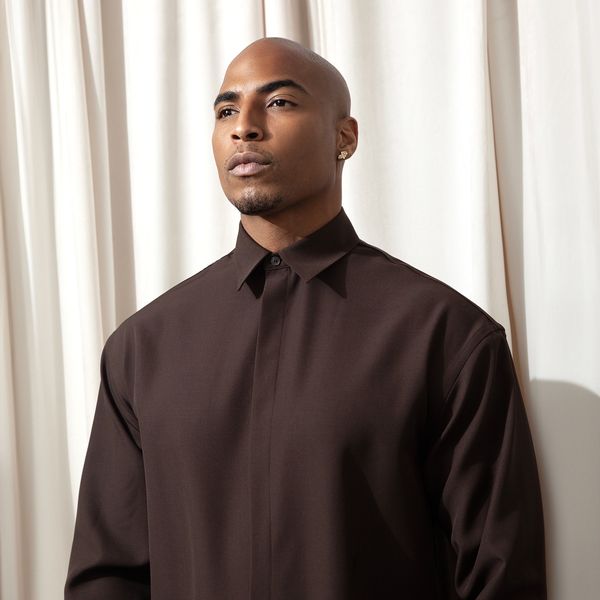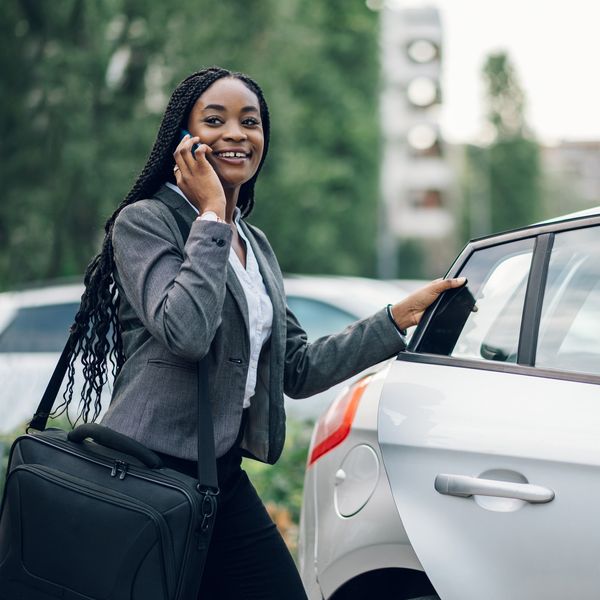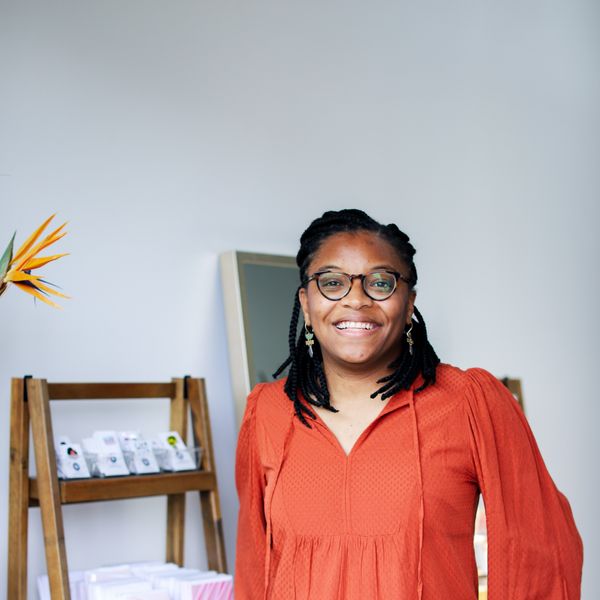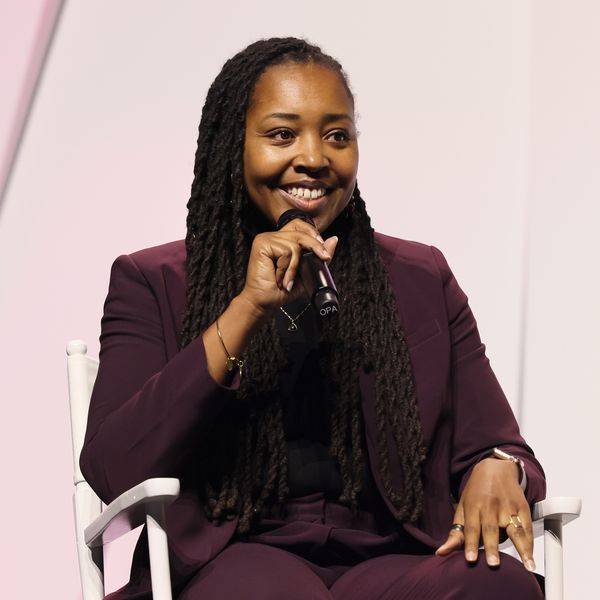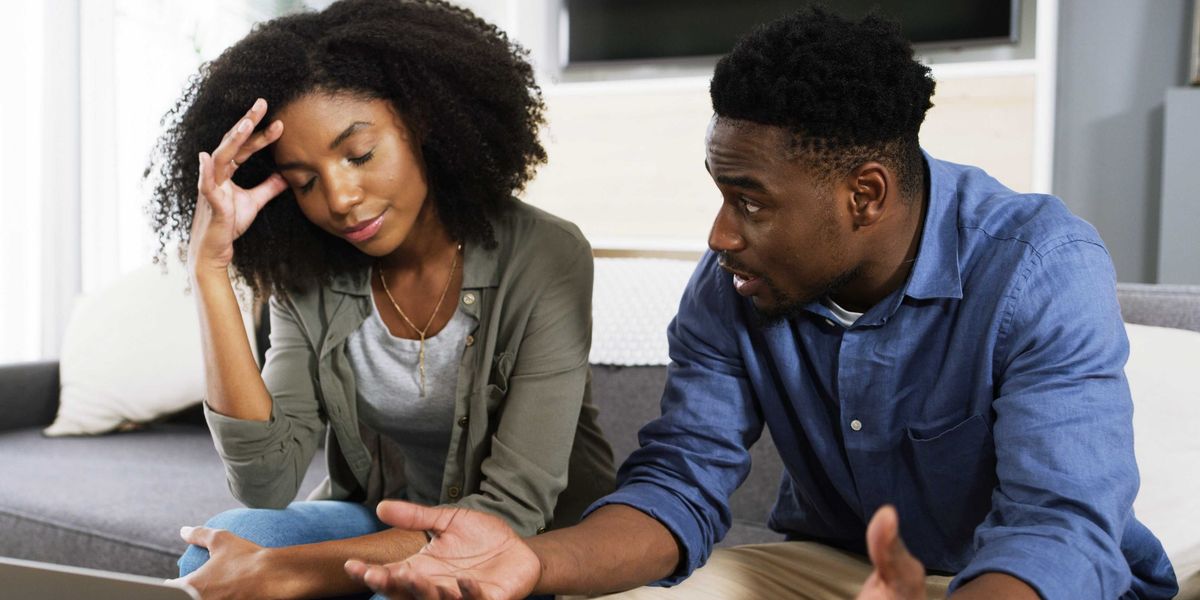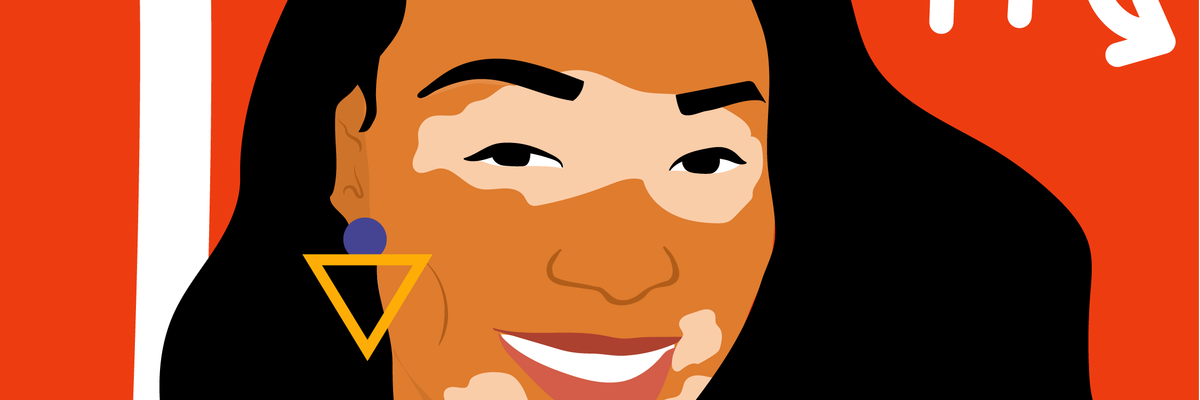Beauty & The Black Dollar: Why Our Collective Power Is Key To The Survival Of Black-Owned Businesses
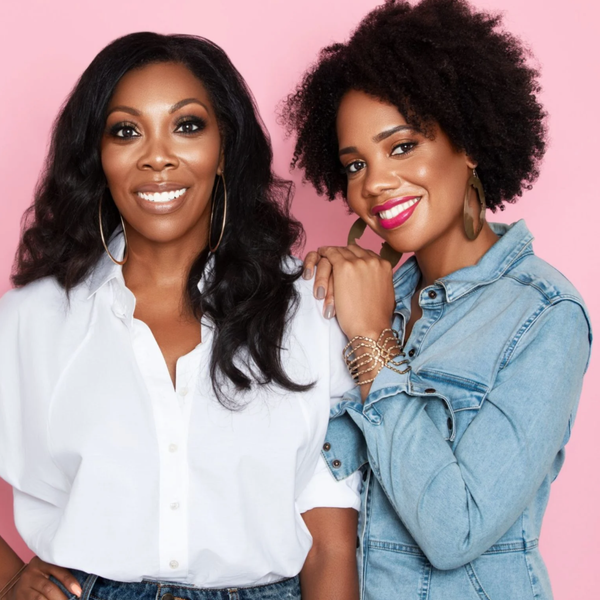
For months we've been adjusting to a new way of working, living, and connecting as COVID-19 and its effects actualize themselves in our lives. And while I've personally forgone my hopes of a traditional #HotGirlSummer, some states have announced plans to re-open despite warnings from officials that the pandemic is "far from over." This, paired with weeks of global unrest in response to yet another wrongful murder of a Black person, has left the most vulnerable communities in a season of constant change.
Black and woman-owned small businesses are among them.
From Madam C.J. Walker to Honeypot's Beatrice Dixon, Black women entrepreneurs have played a vital role in our country's business landscape, spreading their magic across industries and color lines. And although these have proven to be trying times, a renewed focus on these contributions has resulted in a swell of support and heightened interest in seeing Black women-owned entities succeed.
Founders like Yelitsa Jean-Charles of Healthy Roots Dolls can attest to this after a now-viral Tweet translated into sales typically seen over the course of months, in just two days.
The Founder: The Product: pic.twitter.com/o5SNHB368q
— Yelitsa Jean-Charles (@TheYelitsa) June 6, 2020
People are looking for ways to support and reinvest in Black communities to honor their contributions and combat racial inequities that have been hindering their economic and social progression for generations.
I spoke with Black women beauty entrepreneurs who shared more about how they've faced these challenges head-on, and how this surge of support can impact the future of the beauty industry and Black businesses at-large.
-----------------
In late March, millions of Americans began awaiting their $1,200 cut from the CARES Act as a means to withstand rising unemployment and the residual economic onslaught. Similar programs were also put in place to protect small businesses, but not without their own set of hurdles.
The Paycheck Protection Program (PPP), one of the more popular aid programs, provides low-interest loans to small businesses. But with a lack of concrete guidelines and the exhaustion of initial funds after just 13 days, countless small and minority-owned businesses were left helpless while larger companies received million-dollar bailouts.
"If you target your aid toward a certain type of business, we will come out of this pandemic and we will only have that type of business,'' said Amaya Smith, co-founder of the Brown Beauty Co-op. Smith and fellow beauty entrepreneur Kimberly Smith (no relation) co-founded the Sephora-esque beauty hub in 2018. The boutique celebrates women of color by fostering an inclusive community through its featured products, events, and beauty services.
Even in normal circumstances, Black women disproportionately lack investment capital and other resources needed to maintain their businesses and are often sole proprietorships. Despite being the fastest-growing segment of entrepreneurs in the country, they receive less than 1% in venture funding, leaving many without the emergency cash reserves sufficient for said survival.
Early numbers also show a record plummet in the number of active business owners from February to April 2020 as a result of the pandemic.
Of those, Black and female-owned small businesses have been impacted the most, experiencing a 41% and 25% decrease in activity, respectively.
"So, how do we help and support businesses who already had challenges with funding and didn't have as much access before?" Amaya continued. "I actually hope that this period of time highlights the disparity in funding and capital between businesses."
Image: Jhavon Kashif, Founder, Nailbed & Bar
For nail salon-owner Jhavon Kashif, the pandemic has presented the second largest threat to the Nailbed & Bar in its young two-year history.
"The first was the federal government shutdown [of 2019] and here we are with COVID-19, so we've been able to weather those storms but it has been a challenge," Jhavon shared.
-----------------
Beauty and the Black Dollar
We're seeing a global outcry against racism and the structural injustices experienced by Black Americans now more than ever. In addition to the impact of coronavirus, Black entrepreneurs find themselves managing their businesses in the crossfire of backlash many brands are receiving in their not-so-genuine support of Black Lives Matter.
Once taboo, corporate leaders across industries have also announced their support for anti-racist efforts and Black Lives.
Campaigns and calls for action like #PullUpOrShutUp, created by Uoma Beauty founder Sharon Chuter, are highlighting the beauty industry's lack of Black representation and pushing for organizational change to address it.
The Brown Beauty Co-op penned an open letter to Sephora in support of the campaign, expressing their disappointment in the brand's lack of accountability for minimal diversity among executives and mistreatment of customers of color.

Image: Kimberly Smith and Amaya Smith, Co-founders, The Brown Beauty Co-op
Up until this pivotal point, many industries have neglected Black consumers, their spending power, and the importance of inclusive marketing and business practices, all while profiting from their influence.
According to a 2018 Nielson report, Black shoppers aren't only spending on products created to appeal to them, but spend considerably more money in the general beauty marketplace in comparison to their counterparts. "Our research shows that Black consumer choices have a 'cool factor' that has created a halo effect, influencing not just consumers of color but the mainstream as well," said Cheryl Grace, Senior Vice President of U.S. Strategic Community Alliances and Consumer Engagement at Nielsen on the report's findings.
The current state of affairs also reveals the economic and racial inequities that have accumulated and hindered the Black community over time. In fact, studies show us that the Black-white wealth gap remains as wide as it was in 1968.
Our dollar matters, and choosing to spend it at Black businesses is an act of economic activism, one that will have implications for generations to come.
The renewed attention of the protests has amplified the harsh duality of Black experiences to the masses, resulting in an outpour of support and celebration of Black art, beauty, history, and of course, Black business.
"My hope that the support of Black business will continue beyond the protest," said Jhavon on the recent wave of support.
-----------------
Black Women Keep it Pushing in Times of Trouble
The beauty industry relies heavily on personal interactions and physical experiences. Shoppers love to try and test before purchasing and entrepreneurs have had to get crafty about everything from marketing to providing its normal services.
"[During the shutdown] foot traffic was impacted, appointments and walk-ins, but it wasn't anything like this," said Jhavon of the pandemic. "Our doors are closed. We cannot accept anyone in our space to render any kind of service, so we really had to focus on marketing in a different way. One thing that we do that has been helpful is that we produce a lot of our products in-house."
In addition to adapting its luxury salon offerings into a Happy Healthy Nails at-Home kit, the salon expanded the promotion of other original nail care products to drive sales through its e-commerce platform.
As with most devastating events, opportunities remain for Black beauty entrepreneurs to be nimble and personally connect with communities in a way that other large retailers, like those called out in the #PullUpOrShutUp campaign, often cannot.
"Although this is a tough period, it's through these tough periods that a lot of businesses are able to come out better on the other side," said Amaya of the Brown Beauty Co-op. The boutique has kept their community of beauty enthusiasts and founders engaged with a series of virtual shopping parties, entrepreneurship social hours, and Shop Brown Saturdays in addition to its fundraising efforts.
"We're really taking advantage of social media [and] different types of virtual meetings so that we can keep our current customer base engaged but also so we can gain new customers through this," she continued. "I think being transparent is the most important."
-----------------
The harnessing of our collective power will play a key role in the survival of Black and women-owned small businesses. While we collectively work toward a more inclusive society, buying Black ensures our voices are heard and communities are supported.
Learn more about the Black beauty brands and Black businesses, you can support here.
Featured image courtesy of The Brown Beauty Co-op
The Real Reason You Overthink And Crave Reassurance In Love
Over 40 million Americans have an anxiety disorder. However, what if I told you that everyone on the planet experiences situational anxiety - feelings of anxiousness when exposed to certain situations - and this isn't a diagnosis but rather a part of everyday life?
Given the prevalence of anxiety, it's quite possible that symptoms of anxiety will arise not just during the dating phase but even in the relationship phase, and it’s nothing to be ashamed of because it’s simply an effect of being human. Although it's normal to feel anxious, it's important to remember that leaving anxiety untreated can have detrimental side effects that impact our daily lives.
Relationship Anxiety: Signs And How To Overcome It
Anxiety is a common issue many people face, which can significantly impact romantic relationships. Here are several ways that anxiety can show up in romantic relationships and what you can do about them:
Relationship Anxiety Signs #1: Overthinking
The anxious brain can feel difficult to manage. People with anxiety tend to overthink situations, causing them to become anxious and worried about things that may not be a big deal. This can lead to arguments and misunderstandings in a relationship, as the anxious partner may worry about things that the other partner does not find concerning. Challenging irrational thoughts and having conversations about those that feel rational is important. Often, the quick fix to feeling anxious in a relationship is communication.
Relationship Anxiety Signs #2: Need for Reassurance
Individuals with anxiety may need constant reassurance from their partner, which can be draining for the other partner. It is important for the anxious partner to work on building their own self-confidence and trust in their partner.
Relationship Anxiety Signs #3: Fear of Abandonment
Anxious attachment, much? People with anxiety may have a fear of abandonment, causing them to become clingy or too dependent on their partner. This can be difficult for the other partner, who may feel smothered or unable to have their own space. It is important for the anxious partner to learn how to manage their fear of abandonment and trust in their partner's commitment to the relationship.
Going to therapy is often the first step to healing your abandonment wound because it’s much deeper than your partner’s actions, and if you don’t get to the root of the problem, you will continue to watch the problem grow.
Relationship Anxiety Signs #4: Avoidance
Individuals with anxiety may avoid situations or conversations that make them feel anxious or uncomfortable, leading to a lack of communication and intimacy in the relationship. If you want to build a safe and secure relationship, you have to be an active participant in your relationship. Do things like couple experiences or card games to enhance emotional intimacy and build a safe relationship you don’t want to run away from.
Relationship Anxiety Signs #5: Control
Anxiety can lead to a need for control, manifesting in a relationship as controlling behavior. This behavior can come from jealousy and other issues, and it can become destructive and damaging to both partners. It is important for the anxious partner to manage their anxiety and develop healthier coping mechanisms. Remember, being in a relationship does not mean you own your partner. Control is a personal issue that your partner cannot fix for you.
Trying to rob them of their autonomy will cause friction and lead to relationship dissatisfaction based on your inability to be a secure partner. Get the help you need by working through your fear of letting go and discerning where your controlling behavior stems from.
Relationship Anxiety Signs #6: Perfectionism
People with anxiety may have a tendency towards perfectionism, leading to unrealistic expectations and pressure in the relationship. It is important for the anxious partner to learn how to manage their anxiety and develop a more realistic and compassionate view of themselves and their partner.
Anxiety can have a significant impact on romantic relationships. It is important for both partners to work together to manage anxiety, develop healthy coping mechanisms, communicate effectively, and trust each other. However, it is also important to do the inner work, as anxiety can be an internal issue that your partner cannot fix for you.
If you want to build a healthy relationship, you must contribute to it by engaging in healthy behaviors.
Let’s make things inbox official! Sign up for the xoNecole newsletter for love, wellness, career, and exclusive content delivered straight to your inbox.
Featured image by Shutterstock
Originally published on July 14, 2023
- 7 Tips For Anxious Attachment Styles That'll Help You Love More Securely ›
- What Your Attachment Style Says About Your Love Life ›
- What Exactly Is 'Relational Anxious Attachment Style'? ›
- True Life: Dating The Wrong Men Triggered My Anxiety & Depression ›
Your November 2025 Horoscopes Are All About Transformation & Divine Timing
November is the month of trusting your progress and efforts, and not overthinking what needs more time. As we move towards the end of the year, we have some significant retrogrades, but we also have substantial opportunities for growth and abundance. The Sun is in Scorpio, and Scorpio Season provides a certain amount of depth needed to transform and see the beauty in a rebirth.
November is about honoring divine timing and discovering your power through authenticity.
Your November 2025 Monthly Horoscopes: An Overview
The passion is high this month, as we have Mars moving into Sagittarius on November 4 and remaining there until December 15. Mars in Sagittarius is adventurous, forthcoming, and empowered. This is the perfect energy we need to get through the month's retrogrades, as Mars will guide us towards what is the highest good. The following day, we have a Supermoon in Taurus, and love comes full circle. A Supermoon in Taurus is all about gaining clarity within financial matters and relationship developments. This Supermoon brings an awareness of what you need to feel more secure, grounded, and safe in the present moment.
Venus, the planet of love, enters Scorpio on November 6 until the end of the month, and Venus in Scorpio is powerful. This brings an intensity to love, but it is also a good time for intimacy, commitment, and getting some more alone time with a partner. Uranus Retrograde moves into Taurus on November 7 and will be Retrograde here until February 3, 2026. Uranus, during this time, will provide more revelations into matters you have been looking to stabilize and find your ground in since 2018. This transit gives a final opportunity to regenerate new ideas, efforts, and intentions.
The final Mercury retrograde of the year occurs this month, and it begins in Sagittarius on November 9, moves into Scorpio on November 18, and goes direct on November 29.
While in Sagittarius, Mercury retrograde asks to be more patient with travel plans, new adventures, and communicating before you have all of the facts. While in Scorpio, Mercury retrograde will highlight what transformations are needed within relationship dynamics, and what path forward will help you gain your empowerment and inner clarity here. Jupiter also goes retrograde this month and will be retrograde in Cancer until March 10, 2026. Jupiter retrograde in Cancer brings emotions to the surface, and everything can seem a little more overwhelming than it actually is in this energy.
Overall, this transit occurs to guide you through new emotional regulation tools and show you what dreams can come true when you take some time to reflect.
The New Moon of the month occurs on November 20 in Scorpio, and this is a New Moon of manifestation. This New Moon provides the new beginning you have been looking for, and something is inspiring about what presents itself during this time. The following day, the Sun moves into Sagittarius, and Sagittarius Season officially begins. Sag Season is the upliftment we need after a month of closure, clarity, and transformation, and there is a lot to look forward to as we end the month. On November 27, Saturn goes direct in Pisces after being retrograde since July, and with this powerful force now direct, what you have been building and rebuilding through the heart since 2023 comes to fruition in a more grounded and long-term way.
Overall, November is a big game-changer, and what is being brought to the surface is changing things for time to come.
Read for your sun and rising sign below to see what November 2025 has in store for you.
Your November 2025 Monthly Horoscopes For Every Zodiac Sign
ARIES
 AriesKyra Jay for xoNecole
AriesKyra Jay for xoNecoleThis month is about finding your balance, Aries. A lot of things are in motion for you right now, but you may not be seeing eye to eye with some of the people around you in the midst of it all. Your guidance for the month is to choose your battles wisely and to think more about what will benefit you long-term. Mars enters your 9th house of adventure this month, and you are feeling fierce, inspired, and ready.
The Mercury retrograde of the month inspires you to open your mind to what else is possible for you in life, and gives you the clarity needed to make the necessary changes to be in the place you want to be. Before the month ends, we have a New Moon in your 8th house of rebirth, signifying the deep changes you are moving through this month.
As November closes out, remember to set your intentions for where you want to feel the passion, commitment, and depth in your world, and what ideas or perceptions you may need to let go of to see your own truth a little clearer.
TAURUS
 TaurusKyra Jay for xoNecole
TaurusKyra Jay for xoNecoleNovember is all about taking more time for yourself, Taurus. You are in a contemplative mood this month and are seeking more alone time for healing, clarity, and emotional rejuvenation. This month, we have a Supermoon in Taurus on November 5, and this Supermoon is bringing your goals, intentions, and path ahead to the surface. This is the time to let go of what doesn’t resonate with your soul and to pay attention to your inner guidance system and the signs you are receiving in your life right now.
Venus moves into your 7th house of love this month, and love is here for you to thrive and grow in.
Relationship matters feel more promising in this energy, and you are a magnet for love, reciprocity, and romance. Uranus retrograde also moves back into your sign on November 7 for its final transit through Taurus. Until February of next year, you will be reevaluating plans and intentions, and learning more about yourself and what you need to feel both inspired and grounded in life.
With a lot of energy in your 1st house of self and 7th house of love, November is all about finding the balance between what you need and what your relationships are asking of you.
GEMINI
 GeminiKyra Jay for xoNecole
GeminiKyra Jay for xoNecoleNovember is a month of growth, Gemini. You enter the month with the Sun, Mercury, and Mars in your relationship zone, and you are motivated to connect, move forward, and own what you need in love. This is a beautiful month of being met with the love you are giving out, and feeling like you are supported in life. Your wisdom is growing, your inner clarity is shining, and there is something beautiful about the space you find yourself in this month.
Uranus retrograde enters your house of closure on November 7, moving out of your sign and giving you a chance at healing. This is your opportunity to close the door to a chapter in your life that felt more restrictive than freeing, and to develop the insight needed to move on from negative energy for good. Your ruling planet, Mercury, also goes retrograde this month, and will be guiding your heart towards what people, relationships, and experiences light up your life and make you feel loved and seen.
Overall, November is a big month for owning the wisdom you have found in life and in love.
CANCER
 CancerKyra Jay for xoNecole
CancerKyra Jay for xoNecoleThis month is about trusting your instincts and listening to the guidance of your soul, Cancer. You are naturally a very intuitive being, and November is requiring you to use this strength for your benefit. As you enter the month, there is a Supermoon in your 11th house of friendship, community, and dreams, and manifestations appear that you have been looking forward to.
The patience you’ve had in your life shows fruition for you now, and you are recognizing that you’ve had the right idea all along.
Jupiter, the planet of good luck and expansion, entered your sign earlier this year and goes retrograde this month from November 11 until March 2026. What this means for you and your life is that you will be discovering spiritual guidance in new, unexpected places. You may feel like life moves a little more slowly under this energy, but this is needed in order for you to truly understand where an expansion and new perspective are needed in your world.
Before the month ends, there is a New Moon in a fellow water sign, and your heart gets a chance at a new beginning.
LEO
 LeoKyra Jay for xoNecole
LeoKyra Jay for xoNecoleNovember is a month of progress, Leo. You are thinking a lot about the future right now and what’s ahead of you, and are making the necessary plans to bring your dreams to fruition. With a Supermoon in your 10th house of career, goals, and reputation as you begin the month, you are really showing up and allowing yourself to be met with success. You are inspired by what is possible for you in life in November and are making the efforts necessary to meet your goals halfway.
Mid-month, Jupiter goes retrograde in Cancer, and what this means for you is a need to take a step back and focus on your healing. When Jupiter entered Cancer earlier this year, you saw a lot of the gifts that have come from closure and emotional renewal, and with this planet now retrograde, you are getting more into the nitty-gritty of healing and what tough decisions you may need to make to do so.
On November 20, we have a New Moon in your 4th house of family and foundations, and you are getting the opportunity to rebuild, connect with loved ones, and feel more secure in the present moment.
VIRGO
 VirgoKyra Jay for xoNecole
VirgoKyra Jay for xoNecoleThis month is all about finding your balance between moving forward when you feel ready to and taking the necessary time to plan your next steps ahead, Virgo. With a Supermoon in a fellow earth sign to begin the month, there is a lot to look forward to right now, and you are feeling inspired by what is presenting itself. You are moving through November with confidence and conviction, and your eyes are opening to what spaces you want to be in and what people you want to meet along the way.
Your ruling planet, Mercury, goes retrograde this month, and it’s all about taking time within communication matters and new developments in the home.
Ask yourself what stability, safety, and clarity mean to you right now, and be prepared to let go and create the necessary space in your life to receive that. At the end of the month, we have a New Moon in your 3rd house of communication, and this New Moon highlights your communication strengths and interests, and also brings some new people and experiences into your life.
Overall, although we have a lot of retrogrades this month, you are not letting them stop you and are overcoming and moving forward in November.
LIBRA
 LibraKyra Jay for xoNecole
LibraKyra Jay for xoNecoleNovember is your month of abundance, Libra. Venus, your ruling planet, is in your 2nd house of income, values, and self-worth, and you are owning who you are, what you bring to the table, and what you deserve in your life. This is a month of seeing your intentions come to fruition, and progress is made regarding your finances and the plans you have set for yourself here this year. This is your month of owning your efforts and intentions, and knowing you deserve the good that is presenting itself to you right now.
With a Supermoon taking place in your 8th house this month, which rules your shared finances, support is coming in for you, and you have a lot of opportunities to make new gains and to see the gifts of some of the relationships and commitments in your world. Before the month ends, there is a New Moon in your 2nd house of income, and it’s the time to create new intentions for yourself here, and you can do so with some added strength and confidence by what has already come to fruition or you this month.
Positive changes are in store for you, and you have the Midas Touch in November.
SCORPIO
 ScorpioKyra Jay for xoNecole
ScorpioKyra Jay for xoNecoleScorpio Season is here, and you are shining, Scorpio. November is a month of feeling balanced, loved, and abundant, and like you are in the perfect position to find gratitude and own what blessings are ahead of you. We have a Supermoon in your sister sign to begin the month, providing you with the insight needed to see the love in your life with more clarity, and to gain some closure within relationship dynamics that have felt confusing for you as of late.
Venus also enters your sign at the beginning of the month, even further amplifying the energy of love in your life and the sense that you are truly recognizing how loved you are.
Mercury retrograde enters your sign on November 18, and you may need to redirect more of your energy within. Use this opportunity to gain more guidance on yourself, your path, and your goals, and remember to give yourself a little more compassion during this time. Before the month closes out, we have a New Moon in Scorpio on November 20, and this is a powerful time for seeing your manifestations appear. A New Moon in Scorpio is enlightening, and you are owning your passions, your self-confidence in life, and what new doors are opening for you now.
SAGITTARIUS
 SagittariusKyra Jay for xoNecole
SagittariusKyra Jay for xoNecoleNovember is all about owning your power and not counting yourself out, Sagittarius. This month is about lifting your head and remembering who you are and what matters to you in life. Mars enters your sign as we begin the month, and this is powerful energy for direction, new beginnings, and inspiration, but you may also be feeling some combative energy in your life in the midst of it all.
With Mercury also going retrograde in your sign for a little over a week, be careful with getting ahead of yourself right now, and take your time with things by knowing that you are supported and your dreams are coming to fruition in due time.
Sagittarius Season officially begins on November 21, and you feel more of the strength in your life as you close out the month. With Venus also moving into Sagittarius on November 30, a lot of the self-doubts you were having at the beginning of the month are long behind you now, and you finally get to see more of the progress you have been making in your world.
Overall, this month is about balancing patience with conviction and knowing that what is meant for you will not pass you by.
CAPRICORN
 CapricornKyra Jay for xoNecole
CapricornKyra Jay for xoNecoleYou are making strides this month, Capricorn. November is a month of victory, progress, and achievement, and you are owning what you have been building in your world. You begin the month with a Supermoon in your 11th house of hopes and dreams, and this is a beautiful time for seeing your intentions appear and things looking even better than you had expected them to. The universe really wants to show you how loved and cherished you are this month, and will be giving you plenty of signs to show that to you.
Jupiter goes retrograde in your opposite sign mid-month until February of next year, and during this time, you will be able to revitalize some of your close partnerships and gain more clarity on what you need to feel more safe and inspired here. You may feel like some relationship dynamics are more up in the air than you are used to, but this is necessary for you to really see what and who you want to commit to long-term.
Before the month ends, your ruling planet, Saturn, goes direct in your 3rd house of communication after being retrograde since July, and you are taking a deep breath, getting the answers you have been looking for, and finding your peace this month.
AQUARIUS
 AquariusKyra Jay for xoNecole
AquariusKyra Jay for xoNecoleNovember is a new beginning for you, Aquarius. You are setting new intentions and focusing a lot on your career and financial world this month. The month begins with a Supermoon in your 10th house of career, and you are seeing the fruition of some of the developments you have made in this area of your life over the past month. A lot of opportunities are coming to the surface for you, and you deserve to feel abundance, support, and clarity in the world.
This month is about owning who you are, your gifts, and what efforts you have made to live the life of your dreams.
Mid-month, Jupiter goes retrograde in an area of your life that rules your daily routine and working environment, and you are making a lot of changes in your world. Your career and work-life get a revamp this month and for the rest of the year in general, and this is happening so that you can increase your earnings while also feeling better about what you are doing daily. As we end November, Saturn goes direct in your 2nd house of income and earnings after being retrograde since July, which is even further increasing the abundance in your world.
Overall, you are claiming your successes and doing what is necessary to feel good within.
PISCES
 PiscesKyra Jay for xoNecole
PiscesKyra Jay for xoNecoleDreams come true and miracles are possible for you this month, Pisces. November is about opening your mind to everything you can experience in your world, and about being a magnet for your desires by being open to it all. Venus is in your house of inspiration, adventure, and travel this month, and you are meeting love in unexpected places. You are feeling more of the magic in your world in November overall and are being met with the beauty you create around you.
Jupiter goes retrograde in your 5th house of romance mid-month, allowing you to gain more clarity in matters of the heart and to reveal what joy means to you and what and who you want around you to feel more stable happiness and less shake-ups in your world. Saturn goes direct in Pisces on November 27, before the month ends, and this is really a ground-breaking moment for you.
With Saturn now direct and in Pisces until February 2026, you are following your dreams, laying down new foundations in your life, and feeling like things are finally lining up for you.
November is about owning the magic you create in your world, Pisces.
Let’s make things inbox official! Sign up for the xoNecole newsletter for love, wellness, career, and exclusive content delivered straight to your inbox.
Featured image by Kyra Jay for xoNecole

